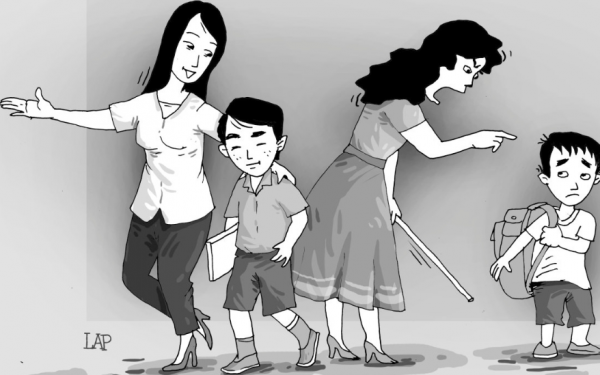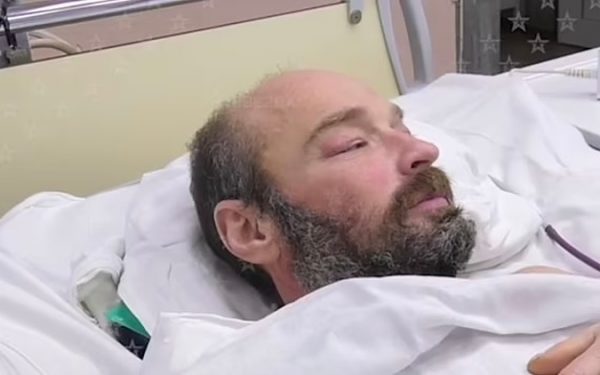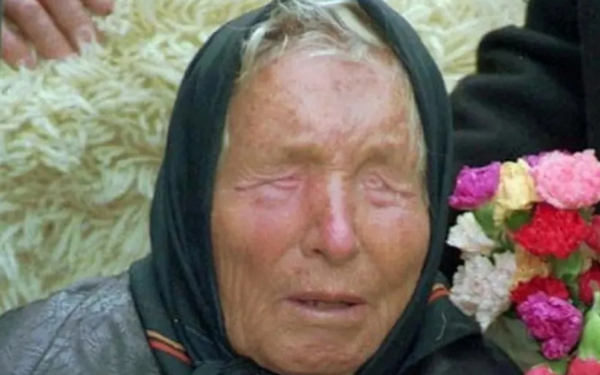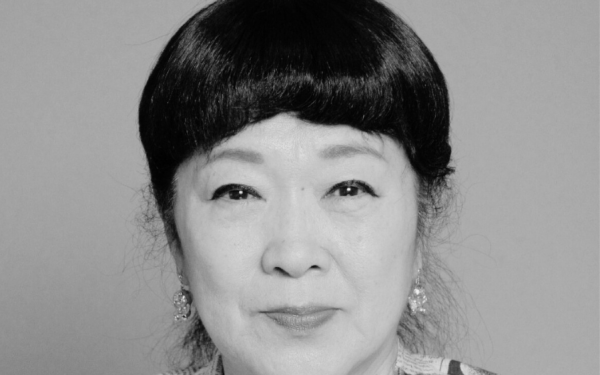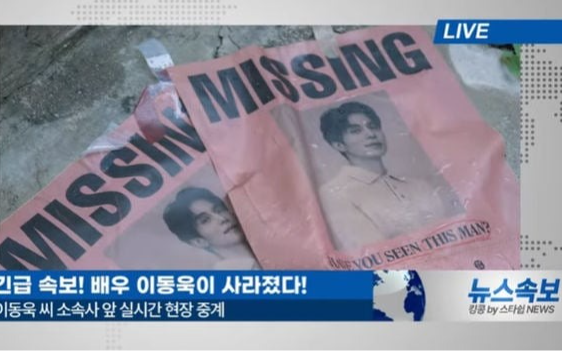Legendary movie actress ROSA ROSAL celebrates her birthday
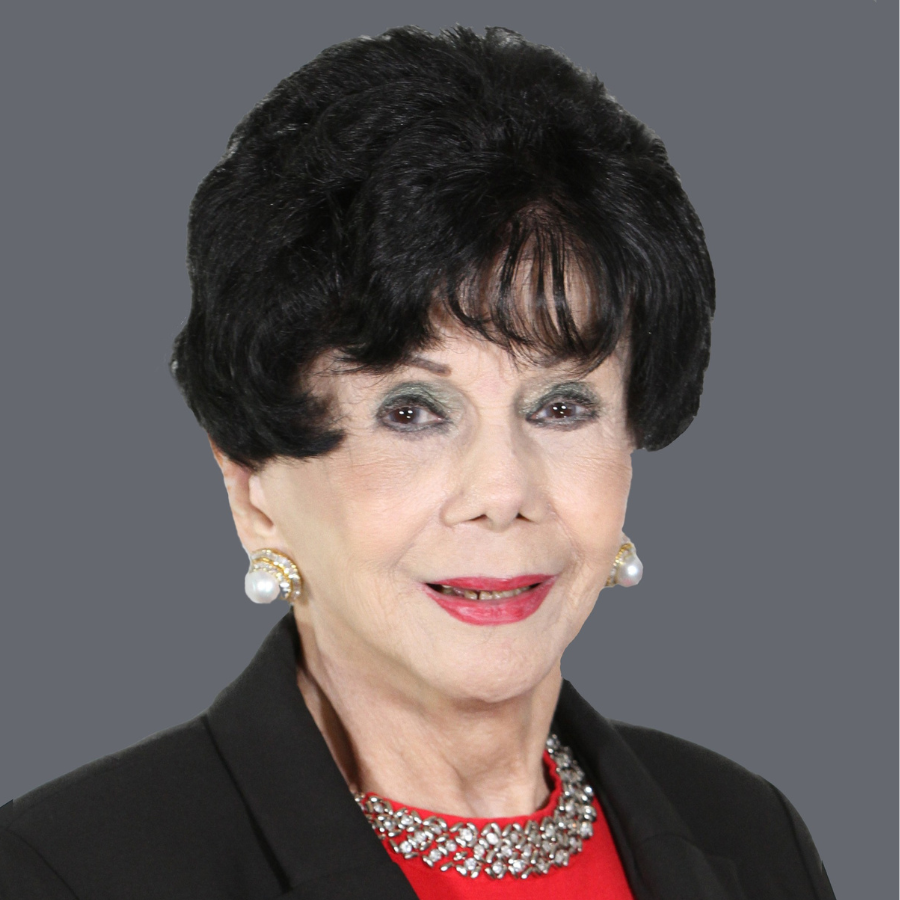
Dubbed as the original "Femme Fatale of Philippine Cinema", Rosa Rosal, Florence Lansang Danon-Gayda in real life, is an award-winning actress who is also known for her work with the Philippine National Red Cross. She received the 1999 Ramon Magsaysay Award for Public Service, Asia's equivalent to the Nobel Peace Prize, in recognition of her lifetime volunteer work and selfless service to the humanitarian organization.
*TRIVIA: Rosa Rosal was born on October 16, 1931. Her father is French-Egyptian while her mother is Filipino. Her screen name is the Filipino word for rose (Rosa) and gardenia (Rosal). Rosa is the mother of TV host Toni Rose Gayda.
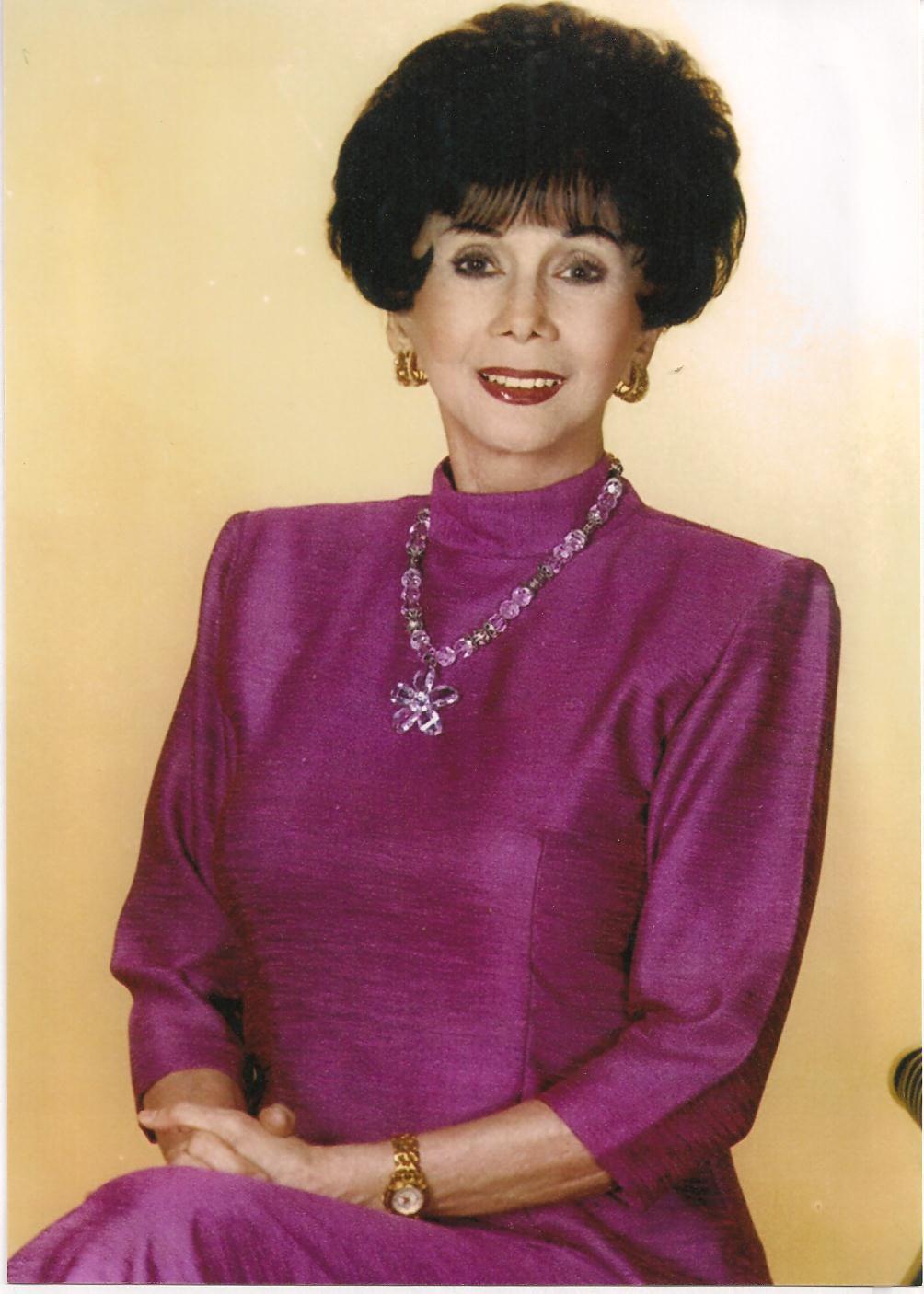
Little in Rosa Rosal's early life offered hope of the bright future that, even at a young age, she was so sure she would have. Her foreign father died before she could know him; home was a small apartment in one of Manila's most crowded districts; and World War II exploded when she was barely a teenager. Despite all those setbacks, Rosal knew in her bones that someday she would be somebody, although she did not know how.
Florence Lansang Danon, as Rosal was christened, was born in Manila on October 16, 1931. Her Filipino mother, Gloria Lansang, was from Santa Rita town in the province of Pampanga . Florence's father, Julio Danon, was of French descent on his father's side and Egyptian on his mother's. Rosal has no memories of her father and does not even know if he lived to see her. She knows only that her mother was much younger than Julio Danon when they were married, eighteen years old to his fifty, and that he was a widower with children from a previous marriage.
After Julio died, Gloria and her young daughter stayed with her mother. When Florence was five years old, Gloria married Ruperto del Barrio, a Filipino who was in the buy-and-sell business. The new family moved into a small apartment on O'Donnell Street in downtown Manila's Santa Cruz district. Gloria supplemented her husband's income with a catering enterprise; she was, like most women from Pampanga, not only a conscientious homemaker but also a fine cook.
She and del Barrio had five children of their own-three daughters and two sons, including a set of twins-but Florence always considered herself the eldest child and thought of Ruperto as her father. She used the surname "Del Barrio" at school. Ruperto was, she says, "very quiet and soft-spoken, a wonderful man who loved my mother very much and was very protective of her and of me."
When the children started coming, one after the other, Florence readily assumed the responsibilities of an "ate" or eldest sister. With both their parents busy earning a living for their big family, it fell on Florence to look after her siblings and to do the house chores as well. It was not always easy for her, with the young ones creating a ruckus and demanding her attention simultaneously, leaving her very little time to go out and play with her friends. One day she discovered a way to induce her siblings to take their siesta: a little beer for them after lunch, she learned, would not hurt. When their mother came home later in the afternoon, she would marvel at how well-behaved the children were and at how Florence was able to keep them quiet.
Gloria and Ruperto made sure they had a well-behaved, tightly knit family. They always took their meals together and attended Sunday mass. Rosal remembers that her mother would say, "Don't allow God to wait for you." It was Gloria who formed the children with her wisdom and compassion and her unfailing optimism and openly affectionate nature. Rosa Rosal today says, "Whatever I am now, whatever character I have now, I give the credit to my mother." Gloria had no more than a high school education but, to the young Florence, she imparted lessons for life: "She told me always to be humble. She said, 'If you want to get wherever you are, just remember one thing: never step on anybody's toes. If you want to do something, do it nicely, talk to people nicely, but never push your way just to get ahead.'"
Florence began her schooling at nearby Antonio Regidor Elementary School. She was a feisty girl, and in her Santa Cruz neighborhood she was known as an extremely curious and adventurous child who did not shirk from a challenge. She showed an early inclination for leadership and pricked not a few egos among her fellow students because of her strong, aggressive personality. In physical education class, she would correct the way her classmates did the exercises. She manifested an independent spirit and unusual physical strength, and thought nothing of lifting heavy metal objects when she wanted to rearrange things on the campus. She protected other girls from bullies, whether male or female, and would not stand for any injustice. This led to "incidents." Her mother was called to school after every one and young Florence would explain that she was just trying to protect her fellow students. With her assertive personality, self-confidence, and good memory, she won a number of interscholastic declamation contests.
The Del Barrioses' peaceful family life was interrupted when World War II broke out. During the Japanese occupation of Manila, she was told by neighbors that a meeting would be held at the San Lazaro Hippodrome to brief people on what to do in case they needed to evacuate. She was twelve years old but readily said she would go and attend the meeting. Afterward, she gathered her neighbors and shared with them what she had learned, including what to do in case of an air raid. When bombings occurred, Gloria pushed all her children-five of them by now-under the dinner table, counted them, and then covered them with her body. She was like a "mother eagle," Rosal says.
After graduating from Antonio Regidor, Florence enrolled at the Arellano High School. She liked her English and history classes but had problems with mathematics. In any case, the Japanese occupation of Manila disrupted her studies.
In 1944, a year before American forces liberated the Philippines from the Japanese, Florence applied at a Japanese radio station for work as an announcer. There was an opening for a news reader in English, a position she was well-prepared for because, thanks to her habit of reading the English-language newspaper aloud, she had acquired a facility with the language. She was hired to read the seven o'clock morning news but always arrived at six. The station was at the Escolta, Manila's elite business district at that time and a short walk from Santa Cruz.
Because Florence was barely in her teens, the other Filipinos on the staff were protective of her. She worked there for almost a year and her Japanese employers were happy with her. But one day, as she walked into the studio-early as usual-and started to listen to the news on the radio, a burly Japanese came in and snarled at her. He then slapped her so hard she fell. She did not understand what he was saying. She had not realized that the news she was listening to was from a forbidden short-wave radio-the source of his fury. Two older Filipino colleagues took pity on her. They urged her to leave the station and get out of Manila. Without fully understanding why she was given this advice, she obeyed.
At that time, her mother and step brother Manny were about to leave for Santa Rosa, Laguna, a town south of Manila, to negotiate for a rice-trading business on behalf of Ruperto, who was ill. Florence told her mother she wanted to go with them but did not let on about the incident at the radio station. On their way to Santa Rosa, they encountered a Japanese who was hitting people with a hot iron. Wearing a hat and a man's shirt and pants, Florence had already walked past him. But he must have noticed that she wiggled her hips when she walked and, becoming suspicious, he took off her hat and discovered that she was a girl. He was about to hit her on the face when she quickly raised her hand and parried the blow.
As they proceeded, Florence and her mother and brother learned that American soldiers were approaching. Warned of being caught in a crossfire, they took shelter in the home of her mother's sister in Bacoor, a town in Cavite Province. Suddenly there was a commotion outside, then gunfire. The next thing Florence saw was her aunt's headless body and her mother's arm was bleeding. She became hysterical and turned to some Americans who had arrived on the scene. "My mother got hit," she cried. An American soldier held her and assured her they would take care of Gloria. When an ambulance arrived to take her mother away, Florence escaped from the soldier's grip and ran after the ambulance and climbed in with her brother, all the while shouting, "I want to be with my mother."
"You know," Rosa Rosal says today, "when I was a little girl, I was strong. I was very strong."
Later, at a school in Bacoor that had become a makeshift evacuation and treatment center, Florence realized that Manny had been hit by shrapnel. Losing no time, she pulled it out herself as blood oozed from his wound. As the doctors attended to Manny, Florence witnessed the gruesome sights of a war hospital, including the urgent amputations of arms and legs without benefit of anesthesia. It was there that she saw blood plasma for the first time. She did not know what it was but the memory stayed with her.
While waiting for her mother to regain her strength, Florence worked briefly in Bacoor. A Filipino general, upon learning she could type, asked her if she could work for him. In return, he would make sure she, her mother, and brother returned to Manila safely. Florence agreed and the general kept his word.
When Gloria recovered, she returned to the apartment in Santa Cruz with Florence and Manny. The American doctors in Bacoor had recommended amputation for Gloria's wounded hand but Florence would not hear of it. Back in Manila, she took her mother to a hospital and was told by doctors there to make sure Gloria got large doses of Vitamin C. In time, the hand healed.
After the war, Florence applied for work at the National Chest Center in the government-owned San Lazaro Hospital, to help her parents support their large family. She had not finished high school yet but she could type a little. Any kind of job would do, she told Dr. Sixto Francisco when he asked her what she was applying for. The doctor, seeing the young girl's earnestness, not only hired her but also took her under his wing and became, says Rosal, "like a father to me."
The full-time job required Florence to come in at eight o'clock in the morning. She was at the office by seven and would make sure Dr. Francisco's desk was clean by the time he arrived. Not content with just doing her work, she began to familiarize herself with the functions of the other departments when the doctor was out. She learned how to operate the x-ray machine and before long was helping out regularly in the x-ray plates department. Because the National Chest Center was inside the compound of San Lazaro Hospital, which also treated leprosy, she often saw leprosy patients going in and out of the hospital. She remembers one in particular, a woman who had already lost both her parents and all earthly possessions. From her meager salary, Florence gave her some money to buy medicine. She also shared her snacks and lunches with whoever needed food at the office. Her mother would make sure she always had plenty for sharing.
One evening, while walking home, Florence passed a group of people shooting a film on the street. Someone apparently noticed her exotic features and a man approached to ask if she would like to be an "extra," that is, to appear in a group scene. Florence said yes and her movie career was suddenly launched.
Although she had only a minor part in the film, a close-up of her face, highlighting her French-Egyptian-Filipino features, appeared on the screen. She must have made quite an impression because film producer Luis Nolasco, head of the Nolasco Brothers studio, offered her a film contract. But Florence did not bite immediately. Give me a screen test first, she told him. He did and then cast her in the film Fort Santiago in 1946. The following year the Nolasco Brothers gave her the part of a seductive villain in a movie titled Kamagong starring Leopoldo Salcedo, a film star known as the "John Barrymore of the Philippines." (Kamagong is a Philippine hardwood tree.) Only sixteen at the time, she made her mark.
Until she signed her first movie contract, Florence continued to put in hours at Dr. Francisco's office. The kind doctor did not want her to lose her salary at the Center and allowed her to take off from work on days when she had a shooting schedule. Florence so appreciated his generosity and concern that when she was finally offered a contract, she showed it not only to her parents but also to Dr. Francisco. He gave her his blessing with words she remembers to this day: "Okay, you have your wings now, you can fly."
Florence Danon was not the only mestiza in Philippine movies at that time. It was an era when Filipino movie fans were partial to fair-skinned and sharp-nosed actors and actresses, the most popular of whom were Filipino-Americans who adopted Filipino screen names. A foreign-sounding name like Florence Danon just would not do. Producer Nolasco launched a contest among movie fans to give the newcomer a name, but none of the entries he received appealed to him.
Then one day he hosted a party for a Hollywood producer named Sidney Salkow to which Florence was invited. On the buffet table was a floral arrangement that included beautiful red roses and white gardenias. Florence picked up a gardenia, which is called rosal in the predominant Tagalog dialect of the Filipinos. "How nice, a rose and a rosal," she remarked. Nolasco overheard his new star's remark and blurted out to her, "That's your name." And so Rosa Rosal she became.
For someone who had had absolutely no experience in acting, Rosal took to the movies with uncommon flair. "It's a gift," she says of acting. "Real actors are not made. I feel that an actor or an actress is truly born an actor or an actress."
Kamagong made the other studios aware that the new star had tremendous potential. They all wanted her. Rosal chose LVN Studios, which was one of the "Big Three" in movie production in the Philippines at the time. In her first film for LVN, a comedy titled Biglang Yaman in 1949, Rosal had one of the studio's biggest actors for her leading man, Jaime de la Rosa.
In the meantime, Rosal yearned to finish high school and got her studio's permission to do so. She passed senior year and graduated and then took night classes at the Cosmopolitan College in downtown Manila. She chose to major in business administration and attended classes from five in the afternoon till nine in the evening. Among her classmates was a young man named Antonio S. Villegas, who decades later was elected mayor of Manila.
Rosal's rise in the movie industry could only be described as meteoric. As early as 1947, she told her mother she would become the next movie queen. Her mother cautioned her against being cocky. "Don't brag," she told Rosal, and reminded her where her gift for acting had come from: "God gave you your talent." But Rosal's instincts were on the mark. The following year she was acclaimed "Queen of Philippine Movies."
Rosa Rosal captured the imagination of Filipinos-not only movie fans but the entire nation-and piqued their curiosity with her flair for headline-making publicity stunts. Decades later, she told a young entertainment reporter, "If it was raining, I would come out in public in a backless top. If it was sunny, I'd wear a turtle-necked sweater." She once walked her dachshund along Dewey Boulevard (the Philippines' famous avenue beside Manila Bay that has since been renamed Roxas Boulevard) wearing short shorts and a tight sweater. On such audacious forays she stopped traffic, in one instance causing four cars to crash into one another. She cultivated and relished the image of a glamorous movie star.
Rosal was the Filipino soldiers' pin-up girl during the Korean War. She not only wrote letters to them and shipped a crate of dried fish for them at Christmastime, she also went to Korea to entertain them. When the war ended in 1953, she was at the pier to welcome them home with garlands of sampaguita blossoms, the sweet-smelling Philippine jasmine and national flower. When the last batch of troops arrived, Rosal made the front pages of the city's newspapers by kissing on the lips the first soldier she saw. "I felt that these are people who have fought for our country, and I was so proud I was Filipino," she said to explain her "scandalous" behavior, which riled not a few military wives who had been kept at a distance during the arrival ceremonies.
Rosal was described as the "original femme fatale" of Philippine cinema, a movie star who "had no qualms about wearing bathing suits, doing kissing scenes, and playing villainess and vamp" in her films, as one writer put it. Among the movies she made during the early 1950s were Ang Lumang Simbahan (The Old Church) in 1949; Mahal Mo Ba Ako? (Do You Love Me?) in 1950; Bayan o Pag-ibig (Country or Love), Amor Mio (My Love), and Prinsipe Amante sa Rubitanya (Prince Amante in Rubitanya) in 1951; Matador (Killer) in 1952; Mga Pusong May Lason (Poisoned Hearts) in 1953; and Dakilang Pagpapakasakit (Great Sacrifice) and Donato in 1954.
Rosal made four movies with Luis Nolasco, among them Apat na Dalangin (Four Prayers), where she played a villainess. It was a role she enjoyed more than that of the sweet, chaste young Filipino woman because the former allowed her to do real dramatic acting. She was so convincingly good as the "bad" woman that audiences sometimes broke into spontaneous applause during her films.
In Rosal's time there were no acting workshops that newcomers could sign up for. Movie stars came in raw and learned on the job. In Rosal's case, the self-discipline she had learned early in life came in handy. She was always punctual and well-prepared for the day's shooting, her lines rehearsed and her role internalized.
Critics heaped praise on Rosal for her acting prowess. One writer, describing her role in Prinsipe Amante sa Rubitanya, said she was "stunning as the seductive princess who uses her beauty to win a kingdom." She could essay any part assigned to her. She was a swordfighter in Dagohoy in 1953, a nightclub hostess "offering hope to an embittered war veteran" in Anak Dalita (The Ruins) in 1956, and a tribal princess-bride in Badjao in 1957.
In Biyaya ng Lupa (Blessings of the Land), she was "stirring and inspiring" as a farmer's widow who coped with her husband's murder and her daughter's rape. Her role in this film was "very unglamorous," Rosal says, and the studio's makeup artist had to make her, a real-life twenty-seven-year-old, believable as the mother of four grown-up children. She wanted the role so much that, to convince the skeptical producer that she could do justice to it, she insisted that she be given a screen test. Rosal says that Biyaya ng Lupa, which has been ranked by film critics as a classic Filipino film along with Badjao and Anak Dalita, is the best movie she has ever made. Years later, in 1976, she impressed the critics once more with her interpretation of an oppressed sugar plantation worker in the film Sakada (Migrant Workers), which became controversial for tackling a sensitive sociopolitical issue in martial-law Philippines.
Offscreen, the publicly coquettish Rosal was a very private person who cherished the little time she could spend with her family. With her income from the movies, she now had her own home in a quiet residential area in Quezon City, just outside Manila. Unlike many of her colleagues, she disdained carousing at night and was neither a smoker nor a drinker.
As passionate as she was about her film career, Rosa Rosal was determined to earn a college diploma. Struggling through night school, in 1954 she completed her four-year course at Cosmopolitan College. The following year, she won her first award, as best actress for her lead role in the tearjerker Sonny Boy, from the Filipino Movie Arts and Sciences, or FAMAS, the Philippine movie industry's equivalent of Hollywood's Oscar awards. She herself had been the sculptor's model for the slim-waisted woman portrayed on the trophy.
The following year she won an even bigger prize, the FAMAS International Prestige Award for Anak Dalita. The picture had won the best picture award at the Asian Film Festival in Hong Kong, a first for the Philippine film industry. An elated President Ramon Magsaysay immediately sent Rosal a telegram of congratulations and later went to the LVN studio to present her with a citation.
Rosal had by this time also conquered radio through a soap opera with LVN colleague Jaime de la Rosa, for which she won an award as best radio actress. It was only logical that when television came of age in the Philippines in the early 1960s, Rosal would also become one of the first movie stars to shine on the small screen. She became a familiar figure on the highly acclaimed television drama series Balintataw. In 1969, she received a Citizens' Award as best actress for television from the Citizens' Council for Mass Media for her sensitive portrayal of an illiterate laundrywoman who bears a daughter by an American soldier in an episode titled "Hello Soldier."
Drama was Rosal's forte but she proved to be equally at home with comedy. In the early 1970s, television provided the vehicle for her versatility through a weekly family-oriented sitcom called Yan ang Misis Ko (That's My Wife). The show, which aired for almost a decade, chronicled a middle-class family's adventures and misadventures and paired Rosal with an equally talented Filipino-Russian actor named Ronald Remy, who played her husband.
In 1975, the GMA 7 television station invited Rosal to co-host the country's first public service program on TV called Kapwa Ko, Mahal Ko (I Love My Fellow Humans). "I started showing poverty on television and the money just kept pouring in," is how Rosal explains the program's impact. The following year, she moved to the government-owned Channel 4, which gave her her own daily public service show, this time dubbed Damayan (Mutual Help). The Philippines has gone through several changes in political leadership since 1976, but Damayan remains as strong as ever, its objective essentially the same-that of providing a listening ear and a helping hand to the needy and ailing. Rosal continues to host it up till now but the show has reduced its frequency to twice a week. She has also agreed to have an assistant, a young woman who has taken over some of the show's segments.
Long before Rosa Rosal became a major star, she had assumed yet another identity-in fact, another life-and been consumed by it. She had become a Red Cross volunteer.
It was an American named Ray Higgins who took Rosal along for a blood donation drive in 1948 and introduced her to the work of the Red Cross. At the hospital with Higgins, she saw people queuing up to give blood voluntarily and this impressed her. The experience inspired her to visit other hospitals in Manila. While at the emergency ward of the Philippine General Hospital one day, she noticed a young girl who, she learned from the nurses, had been in a coma for three days after falling from the fifth floor of a building. Told that the five-year-old child needed a neurologist, Rosal sought out her friend, Dr. Victor Reyes, a neurosurgeon. Reyes examined the girl and found that she had suffered internal bleeding and urgently needed blood. Rosal stayed by the child's side as she was transfused with blood, holding her hand and praying throughout the procedure. The child's hand was cold, Rosal recalls, but as the new blood flowed into her body and she slowly opened her eyes and recognized her mother, Rosal knew she would live.
This experience and the miracle of the blood transfusion led Rosal to resolve to work for the blood bank of the Red Cross. Starting as a recruiter, she became, on July 4, 1950, officially a volunteer member of the Blood Program of the Philippine National Red Cross.
Before Rosal could become a Red Cross volunteer she had to undergo a two-week training course. She always showed up for the sessions on time, even if she had been working on a film till six in the morning. As a new volunteer, she worked closely with the mayor of Manila, Ramon Bagatsing, who was himself an active supporter of the Red Cross and its blood program. Rosal suggested that the mayor tap young people to donate blood, starting with the enrollees in the Reserve Officers' Training Corps (ROTC) in the country's schools. The idea appealed to Bagatsing and the project, which was soon christened "Operation Dugtong Buhay" (Operation to Prolong Life), proved to be so successful that Rosal decided to take her campaign to the Armed Forces of the Philippines. The military establishment welcomed her proposal to encourage Filipino soldiers to donate blood and "Operation Purple" was launched.
About a year later, Rosal realized that it was not only Manila that needed a blood bank. Although there were Red Cross chapters in a number of provinces, they still depended on the central office in Manila for blood. What Rosal wanted were blood extension facilities in several provinces. She approached President Ferdinand Marcos and other supporters, and got the approximately P1.2 million that she needed to establish facilities in sixty-two of the Red Cross's eighty-five chapters nationwide. Today, besides those local facilities, the Red Cross operates larger regional blood banks in Cebu, Davao, and Iloilo, three key cities in the country's two other major islands.
The PNRC helps provide blood to the Department of Health, which has its own blood acquisition program but turns to the Red Cross when its supplies runs out.
One day in 1975, Rosal went to a hospital in Manila and saw patients hurriedly packing their belongings. Rosal was told that they were awaiting surgery but had to be sent home because there was no blood available for them. She was outraged. "You're telling me that they will go home to just wait for their death? For them to die?" she declared. The hospital director did not say a word, but Rosal knew what the answer was.
Then and there, she thought of a solution: Clark Air Base, the military facility that the United States maintained in the province of Pampanga, a three-hour car drive from Manila. Losing no time, Rosal sped off to Clark and met with the base commander. Introducing herself as a governor of the Philippine National Red Cross (she was elected to the board of governors in 1965) and an actress by profession, she informed him that an inadequate blood supply in Philippine hospitals was causing many poor Filipinos to die. It was difficult, she told the commander, to convince Filipinos to give blood so she asked if American soldiers at Clark would be willing to do so. There was initial hesitation among the staff at the base, in light of its own need for blood. But the commander was confident that the base hospital could adequately serve both needs. He assured Rosal that the Red Cross team was welcome and would be provided free accommodations for a week; she herself would be billeted in a hotel. Rosal was ecstatic, even more so when she was invited to come back the following morning for a seven o'clock briefing for the staff of the American base. Given the three-hour drive to Clark from Manila, Rosal had to leave her home by four o'clock in the morning. But being a stickler for punctuality, she arrived promptly at Clark, briefed the Americans, and touched their hearts with her appeal on behalf of hundreds of Filipinos who were dying from lack of blood. The response was enthusiastic.
Thus began "Operation Blood Brother" and what became a weekly ritual for Rosal. On Sunday she would be driven to Clark and by Monday afternoon she had blood to send to Manila. She visited all the charity hospitals in Manila, inquiring how many patients awaiting surgery needed blood. In the middle of the night, a hospital would wake her up to say a baby in its pediatric ward needed blood. At times she would travel in an ambulance, alone but for the driver. She would rouse Clark's security commander from sleep and tell him what type of blood she needed. He, in turn, would summon a soldier or officer who could donate the blood and take him to the base hospital. Rosal would wait for two or three hours while the blood was being processed and then return to Manila to deliver the blood to the hospital that needed it. On such nights she would forgo sleep. On one such emergency, she even missed her only child Toni Rose's eighteenth birthday.
The Philippines was then under martial law and a midnight curfew was strictly enforced. Once, while she was on one of her mercy missions, her vehicle was stopped by members of the New People's Army, an armed outlawed communist group. When they saw that the passenger was the popular actress and humanitarian worker Rosa Rosal, they advised her to put a Red Cross flag on her vehicle so that no harm would come to her as she traveled. "We'll make sure you're protected," they told her.
Rosal's relentless campaign for blood donations at Clark ended only when the Department of Health, alarmed by the growing threat posed by HIV-AIDS, put an end to it in the early 1990s. But she continues to wage her campaign at schools, corporate and business offices, and shopping malls. Not even shooting schedules are allowed to stand in the way of these blood donation sorties. She recalls a campaign at the Ateneo de Manila, a private school for boys in Quezon City, and how a little boy happily and proudly watched as his father lay on the stretcher to donate blood. Rosal says it is never too early to teach children about the importance of giving one's blood so that others may live.
In 1988 and 1989, when rebel soldiers attempted to overthrow the government of President Corazon C. Aquino through a series of bloody coups d'état, Rosal was at the forefront of the Red Cross's work to assist the wounded. She went on the air to appeal for blood donations and coordinated the delivery of medical supplies to hospitals in Metro Manila.
The rebels' last hurrah, in December 1989, proved to be their most deadly. Rosal was on the scene almost twenty-four hours during that period. She thought nothing of using a Red Cross flag as a tourniquet for a bleeding man who had to be rushed to the hospital. As the rebels and loyalist soldiers fought it out in the streets of Makati, the Philippines' premier business district, Rosal received an urgent call from radio broadcaster Joe Taruc, informing her that an American billeted at the Hotel Intercontinental in Makati had suffered a heart attack. Braving the snipers on Ayala Avenue, Makati's main street, she walked part of the way to the hotel and took the man to the Makati Medical Center. At the entrance to the hospital, she was met by the hospital director, Dr. Raul Fores, who told her that two of her Red Cross staff were among the casualties.
There was no time for tears. The Quirino Labor Hospital in Quezon City, very close to the military establishment's Camp Aguinaldo, badly needed blood. The hospital director himself had called Rosal. When she arrived at the hospital, she found it surrounded by loyalist soldiers. They helped her take the supply of plasma inside the hospital.
Rosal has always been philosophical about facing death in the course of her work for the Red Cross, whether in a military coup, a terrible flood, or a destructive earthquake. She has faced them all. "I was never afraid," Rosal says. "If I have to die, then so be it."
Going hand in hand with Rosa Rosal's tireless campaign for blood donations has been her zeal in soliciting funds to upgrade the PNRC equipment and facilities. For example, some years ago she initiated a campaign to raise money for the Red Cross's first refrigerated centrifuge, a machine that separates blood into four components so that a single donation of blood can be made available to four beneficiaries. Rosal had resolved to acquire a centrifuge for the Red Cross after seeing a photograph of one. The first stop in her fund-raising campaign was the Philippine Senate, where she got no response. She then wrote to President Marcos, whom she had once impressed by presenting a check for two million pesos that she had helped to raise in a flood relief telethon. He immediately approved her request and, three months later, the Red Cross became the proud owner of a refrigerated centrifuge.
It was Rosal, too, who set up the blood chemistry department at the Red Cross for poor patients. She again approached President Marcos for funds and he again complied. What she did not realize, however, was that she needed a license from the Department of Health to operate blood-testing equipment. She always disliked bureaucracy and a tussle with the Department of Health followed. In the end, the PNRC was granted a license.
In the 1980s, even before AIDS became a worldwide problem, she realized the need for a machine that could test donated blood for the HIV virus. It was expensive, and the Red Cross did not have the money for it. Undaunted, Rosal took her cause to the Philippine Senate. Her attitude, she says, was not unlike that of a basketball player: "If I shoot, fine. If I don't shoot, that's fine, too." She came home empty-handed.
Back at her Red Cross office, she received a telephone call from the first secretary of the Australian embassy in Manila. The man wanted to thank Rosal for having helped one of the embassy staff to secure much-needed blood. After exchanging pleasantries, Rosal offered to take the man to lunch. He agreed, and over lunch she told him about the Philippine National Red Cross and her work there. Then she made her pitch: Was it possible for him to ask his government for help in acquiring an HIV machine? The diplomat said he would try. For several weeks thereafter, Rosal called him at the embassy, asking about his family and following up her request. One day she had a call. The Australian ambassador himself was coming to the PNRC office to present a donation of $50,000.
A week later, Rosal had another phone call, this time from the French ambassador. His government was giving her a similar machine, he said. By the early 1990s, Rosal had not one, not two, but three of these machines-one for each regional center of the Red Cross. The PNRC now has all the machines it needs, including one for testing patients for hepatitis C.
To her regret, Rosal herself has never donated her own blood. Her blood pressure has long been a low 90/60, way below the level required for donors. She wishes, though, that someday "another young girl would pick up this cause," the way she did decades ago.
Perhaps the secret of Rosal's effectiveness lies in her policy of selective volunteerism. "I didn't spread myself thinly," she says. "A lot of organizations have been asking me to join them, but I've said no; I can't butter my bread thinly. I like it thick." She has concentrated her energies only on the Red Cross and Damayan, and intends to continue that way. "We have a lot of dedicated men and women," she points out.
Rosa Rosal could have been chairperson of the Philippine National Red Cross, she says, but she did not want the position "because I would have to take the whole burden on my shoulders." Instead, she has chosen to remain a member of the board of governors. The late President Magsaysay, who knew about Rosal's involvement with the Red Cross, once offered her a government post as head of the Social Welfare Administration, the forerunner of today's Department of Social Welfare and Development. Rosal politely declined the offer, saying she preferred to be a Red Cross volunteer.
She has since earned the admiration and enjoyed the trust of every Philippine president. On his birthday in 1995, President Fidel V. Ramos asked Rosal to come to Malacañang, the presidential palace, because he wanted to donate blood, as he had done yearly since 1963. Rosal herself drew blood from the President, and while doing so told him about the sad fate of a domestic helper working in Saudi Arabia who had been raped by a friend of her employer's, gotten pregnant, and was now in prison. Since being told that story by the girl's family, Rosal had been going from one government office to another seeking assistance, to no avail. The appointment with President Ramos proved to be her lucky break. They had known each other since 1953, when he was a young soldier with the Philippine Expeditionary Forces in Korea and she was part of a Red Cross mission in Seoul. Later, recalling that day in Malacañang to a journalist, Rosal said, "I bled him on a Tuesday. On Thursday, the girl was on a plane and by Friday she was back in Manila." The same journalist quoted President Ramos as saying that Rosal was "very caring. If she whispers anything to me, it is to request something for someone else."
On another occasion, that "something" was a vehicle, a brand-new Hyundai, for the Red Cross. It served its purpose for six years and was later replaced by a new Land Cruiser from Ramos's successor and Rosal's fellow movie star, Joseph Ejercito Estrada. President Estrada also donated P5 million (equivalent at that time to $131,583) in public funds for the renovation of a blood-testing laboratory.
Rosal describes herself as a "doer" and "a very intense person" who gives "total commitment and dedication" to everything she does, "whether I'm paid or not."
"I am a patient and impatient person," she says. "I'm impatient when I call for a meeting at seven o'clock in the morning and people arrive at 7:10 or 7:15. I start the meeting with or without them." On the other hand, she says, "when it comes to begging, I'm a very patient person."
She cites two incidents to illustrate her point. Once, on a visit to the privately run Saint Luke's Hospital, she saw a "beautiful" table that she was told could withstand the burning effect of acid. Told that the table was manufactured by a company called Philippine Laboratories, she promptly made an unannounced visit to the company. It was not until six hours later that the company president arrived. He told her the tables were expensive but she was undaunted. "I need them for my laboratory," she explained. The president became curious about the movie star's passionate involvement with the Red Cross and was soon interviewing her about it. He was particularly impressed when he learned that Rosal was a volunteer worker and that at the time of their conversation-three o'clock in the afternoon-this famous movie star still had not had any lunch. When he asked her why she did not make an appointment with him, she candidly said she was afraid that when he heard her name, he would refuse to meet with her. By the end of their meeting, he had promised to send three tables to the Red Cross, free of charge, because she had been honest enough to admit she did not as yet have the money for them.
Another incident took place at the office of Dr. Edgardo Carrascoso, then the general manager of the Philippine Charity Sweepstakes Office, a government agency that oversees the nationwide sweepstakes lottery and determines which charities will be its beneficiaries. Dr. Carrascoso had earlier promised to give a vehicle to the Red Cross, through Rosal. She was at his office by nine in the morning, as he had requested, but he himself arrived a little before five in the afternoon. She could not budge from her seat as she waited, not even for lunch, because she was well aware that Carrascoso's office was a favorite haunt of politicians out to court his favor. Embarrassed that he had made her wait for hours, he immediately instructed his staff to rush the processing of the papers for the vehicle for the Red Cross and to take Rosal back to her office in it.
But it is not only equipment that Rosal looks after as a governor of the Red Cross. She has also concerned herself with the welfare of its employees. For example, she discovered one day that because there was no office canteen, the staff had to order their lunch from an outside source and were eating it out of plastic bags. Rosal consulted an architect about the cost of constructing a canteen, then asked the Red Cross secretary general for space in the Red Cross compound. Having gotten the land, she then raised the money for the canteen. With the help of Erlin Anderson of the International Red Cross, who was in the Philippines at that time, she was able to get the money she needed. For equipment and utensils, she turned to her friend Lina Aurelio, a leading hotelier in the Asia Pacific. "Lina, look for one hundred thousand pesos for me," Rosal told her friend one day. To Lina's question of where she would get that kind of money, Rosal retorted, "I don't know where you're going to get it, but you're going to give me one hundred thousand pesos."
Lina did not disappoint. Today the Red Cross staff has a canteen of its own, where food is sold at affordable prices and where the waiters are former street children whom the Red Cross has helped to rehabilitate.
That PNRC employees have health insurance today is also a consequence of Rosal's attention. Through her, a Filipino philanthropist left a generous endowment fund to the Red Cross before his death in the late 1980s; over her fellow governors' objections, Rosal got her wish to use the money for a health plan for the staff. She also insisted that everyone be entitled to the same benefits, whether he or she was the secretary general, a clerk, a janitor, or driver.
Hand in hand with Rosal's involvement with the Red Cross is her commitment to helping women in crisis. In the 1950s, at about the same time she started her blood donation program for the Red Cross, and long before she began hosting the television show "Kapwa Ko, Mahal Ko" (I Love My Fellow Human Beings), Rosal initiated a project to assist unmarried and poor pregnant women with their deliveries and to find homes for unwanted infants, as well as to prevent abortions. Rosal remembers her first experience of a potential case of abortion. One day she received a call from a girl who said she was a student at a well-known university and she was pregnant and was about to kill herself. Rosal assured her she would immediately send a vehicle to fetch her but, before she could say anything else, the line was cut. Rosal was able to trace the call to a phone booth but by the time she arrived the girl was dead.
In the early 1990s, Rosal began integrating this personal concern into the work of the Red Cross. With initial funding from the American Red Cross to cover the cost of the women's board and lodging and a salaried social worker program, the project known as the Women in Crisis Center became a component of the Red Cross's social services.
The expenses for the women's hospital confinement and delivery used to be shouldered by the JAKA Foundation. When it withdrew its support from the Center, Rosal had to find another donor. Pagcor is now funding it.
As of February 1999, Rosal counted eighty-two cases of adoption-of babies born to women at the center for whom homes had been found elsewhere. Rosal treasures the letters she has received from some of the children. One of them, from someone who was just a baby when adopted, reads: "Dear Tita (Aunt) Rose, you gave me a family that loves me. You gave children a nice, loving home. You're a kind, gentle person."
Rosal says there are those among the Red Cross board of governors who have questioned the wisdom of adopting the Women in Crisis program. Her standard answer is to assure them that the Red Cross will not be burdened with supporting the program because she is able to tap other sources to funding it.
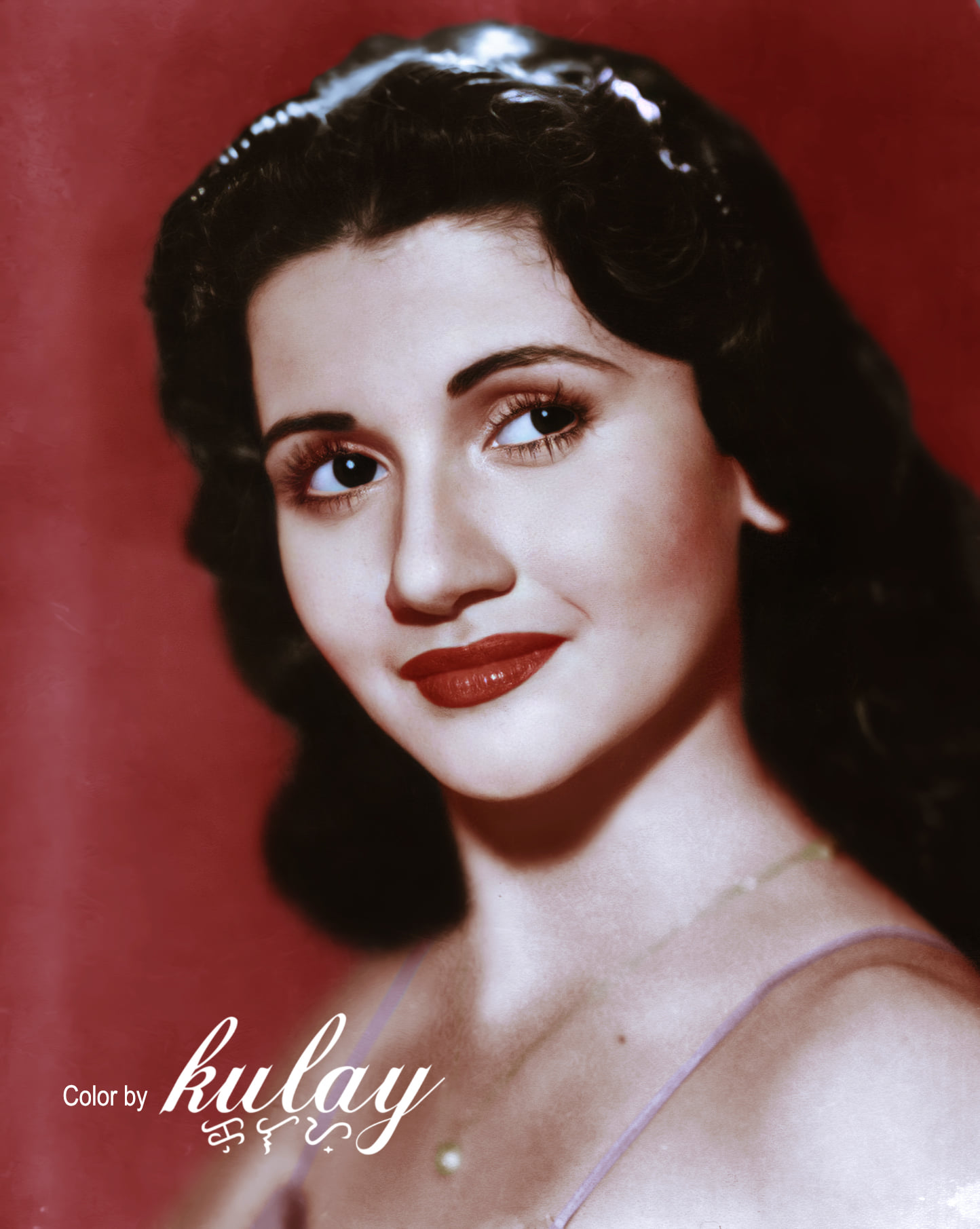
She has in fact mastered the art of finding funders. When an epidemic of dengue fever erupted in the country, and the Red Cross needed two million pesos to respond to the situation, Rosal mobilized four people in the Red Cross to help her raise funds. Rosal also got Erlin Anderson (of the International Red Cross) to help her raise money for the renovation of the PNRC auditorium and the construction of a garage to save the vehicles from further exposure to the elements. She tapped her friends in the Chinese-Filipino community for improvements to the blood donation room.
Besides government agencies, the Chinese-Filipino community, and foreign embassies, she has brought the Red Cross into the consciousness of such donors as the organizers of cockfighting derbies, entertainment personalities, and society matrons, who have helped her through fund-raising balls and other social events.
The PNRC receives no financial help from its counterparts in other parts of the world, each being an independent operation. The Philippines is one of only three countries in Asia where the blood bank does not receive official government support. As an NGO, the Red Cross is allotted a million pesos monthly from the Charity Sweepstakes, a tiny sum considering the Red Cross's P200 million annual budget. Rosal's dream is to convince the government to allocate at least P150 million a year for the Red Cross blood program.
In her personal capacity, Rosal has a scholarship program that has already sent fifteen needy young Filipinos through college, among them are engineers and dentists. Having had to struggle to finish her own education, she believes very strongly that poverty should not keep children from pursuing their dreams. Rosal prefers that the beneficiaries enroll in degree programs rather than in vocational courses. She has created a scholarship fund of six hundred thousand pesos with donations from the Countrywide Development Fund of members of the Philippine Congress. As of 1999, the program was supporting the college education of twenty-six scholars.
Rosal specified only two conditions for her scholars: that they be very, very poor and that they be willing to study so that they could improve their lives. Applicants go through a rigid screening process that includes an interview with a social worker. But Rosal herself talks with each applicant and makes the final decision. Scholarship grants are terminated once a student fails a subject. Most of the scholars are children of Red Cross clerks and drivers and other staff members. One of them was a waiter at the Red Cross canteen who impressed Rosal with his intelligence and diligence. When he expressed an interest in the scholarship program, Rosal told him to take the entrance examination at the Polytechnic University of the Philippines. Among the examinees that year, he was the only one who passed, with a score of 92 percent. Taking up Rosal's suggestion, he stopped working at the canteen and went into an engineering course full-time.
It has been more than fifty years since the day Ray Higgins introduced the young Rosa Rosal to the Red Cross. Today, as one of its thirty volunteer governors, she helps determine and shape policy. She also chairs the PNRC's committee on the blood program, which has the following components: donor recruitment, blood collection, blood testing, component preparation, and special activities that include the maintenance of a clinical laboratory for outpatients and the commemoration of Blood Donors' Month in July.
Rosal turned her back on the movies in the 1970s, when so-called "bomba" or sexy films became the rage, but her tremendous gifts as a dramatic actress continue to shine in occasional appearances in television serials. Her daughter Toni Rose is herself a television personality, one of several cohosts of a long-running noontime variety program. She once said on television that, as a young girl, she was more exposed to her mother's humanitarian activities than to her film career.
Rosal's marriage to Toni Rose's father, an American pilot named Walter Gayda, was shortlived. They met in 1957 in Hong Kong, where Rosal was fulfilling a one-month contract as a singer; three months later, after a long-distance courtship, they were married at a lavish church wedding in Manila whose solemnity was disrupted by screaming fans. Gayda had not been aware that his bride was a big movie star. That belated discovery caused a strain in the marriage and, five days into their honeymoon, Gayda disappeared. He returned when Toni Rose was born the following year but stayed only briefly. Rosal never saw him again. (Walter Gayda died in a car accident ten years later.)
Rosal, though heartbroken, is philosophical about the failure of her marriage. She says, "There are only two lessons that can make a difference: you either become a bitter person or a better person. I chose the latter." A born-again Christian, she believes that had she been a married woman with several children she would not have been able to do all that she has accomplished with God's amazing grace.
